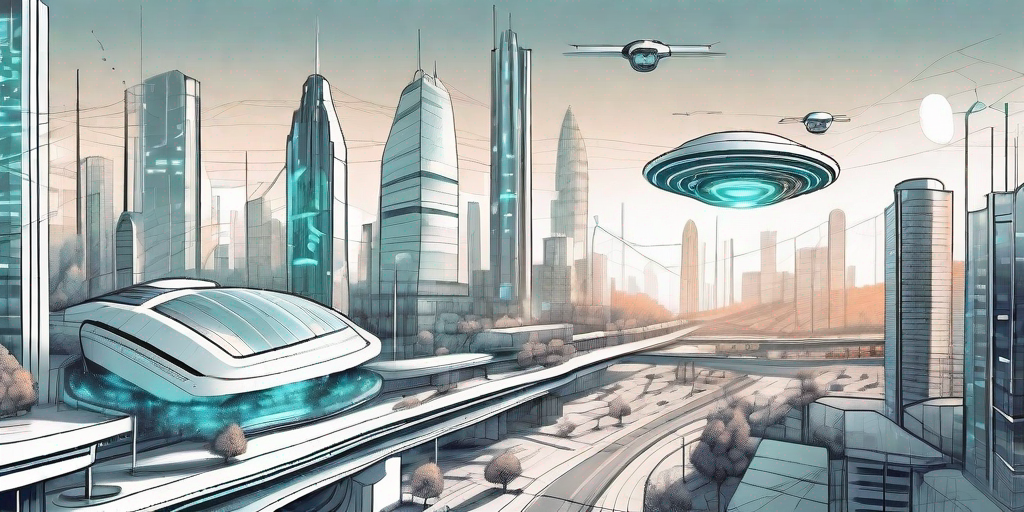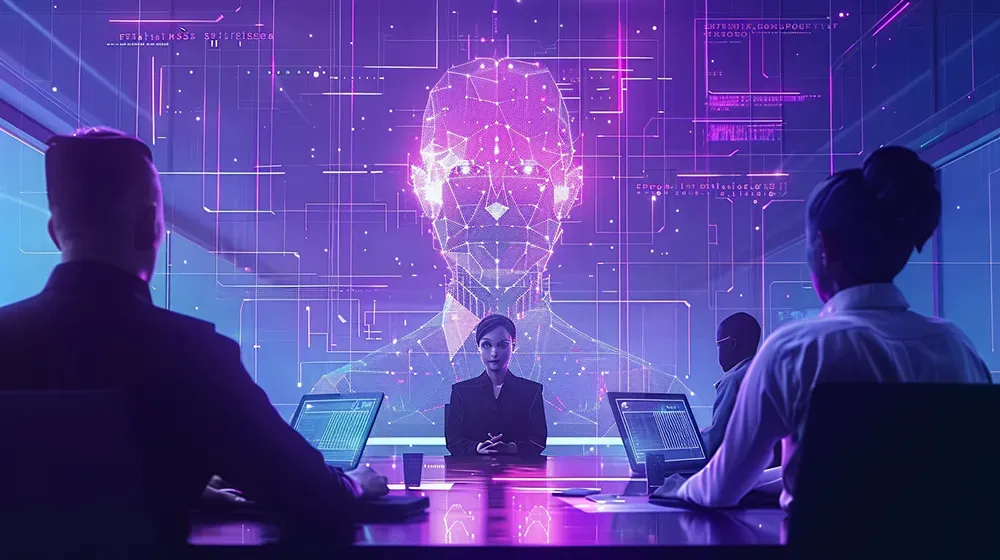An Innovation Futurist's Guide to Understanding Artificial Intelligence

An Innovation Futurist's Guide to Understanding Artificial Intelligence
Artificial Intelligence (AI) is one of the most exciting and transformative technologies of our time. It has the potential to revolutionize industries, reshape societies, and fundamentally change the way we live and work. As an innovation futurist, it is my passion and responsibility to not only understand AI but also guide others in comprehending its complexities and implications. In this guide, we will delve into the basics of AI, explore the role of an innovation futurist in AI education, discuss the potential impact of AI on future societies, examine how an innovation futurist interprets AI developments, and provide insights on preparing for an AI-driven future.
Understanding the Basics of Artificial Intelligence
Let's start by demystifying AI and understanding its fundamental concepts. At its core, AI refers to the ability of machines to simulate human intelligence and perform tasks that traditionally required human reasoning, problem-solving, and learning. This is achieved through the use of algorithms, data analysis, and machine learning techniques. AI can be broadly categorized into narrow AI, which is designed to perform specific tasks, and general AI, which aims to replicate human-level intelligence across a wide range of domains.
Machine learning, a subset of AI, empowers computers to learn and improve from experience without being explicitly programmed. This is accomplished by feeding vast amounts of data into algorithms that extract patterns, make predictions, and generate insights. Deep learning, a subfield of machine learning, focuses on the use of artificial neural networks to enable machines to learn and make decisions in a manner similar to the human brain.
Artificial intelligence has revolutionized various industries, including healthcare, finance, transportation, and entertainment. In healthcare, AI is being used to analyze medical images, diagnose diseases, and develop personalized treatment plans. In finance, AI algorithms are employed to detect fraudulent activities, predict market trends, and optimize investment strategies. In transportation, AI is driving the development of autonomous vehicles, improving traffic management, and enhancing logistics operations. In the entertainment industry, AI is used to create realistic virtual characters, generate personalized recommendations, and enhance gaming experiences.
However, it is important to note that AI is only as good as the data on which it is trained. Bias and ethical considerations can arise when AI systems are trained on a limited dataset or reflect the biases of their creators. Ensuring responsible and ethical AI development and deployment is crucial for a sustainable and equitable future.
As AI continues to advance, there are ongoing discussions and debates surrounding its impact on society. Some argue that AI will lead to job displacement and economic inequality, while others believe that it will create new job opportunities and improve overall productivity. The ethical implications of AI, such as privacy concerns, algorithmic bias, and the potential for misuse, are also subjects of intense scrutiny.
Researchers and policymakers are actively working on developing frameworks and regulations to address these concerns and ensure that AI is used for the benefit of humanity. Transparency, accountability, and inclusivity are key principles that guide the responsible development and deployment of AI systems.
In conclusion, artificial intelligence has the potential to revolutionize various aspects of our lives, from healthcare to finance, transportation to entertainment. Understanding the basics of AI, including machine learning and deep learning, is essential in navigating the rapidly evolving technological landscape. However, it is equally important to address the ethical considerations and ensure that AI is developed and deployed responsibly for the betterment of society.
Role of an Innovation Futurist in AI Education
As an innovation futurist, part of my role is to bridge the gap between complex technologies like AI and the general public. Education plays a vital role in demystifying AI and empowering individuals to navigate the AI-driven world. By utilizing my expertise, I aim to make AI accessible and understandable for people from all walks of life.
First and foremost, an innovation futurist strives to provide clear and concise explanations of AI concepts, free from unnecessary jargon and technical complexities. Through articles, workshops, and public speaking engagements, I aim to break down complex ideas into relatable analogies and examples that resonate with a broad audience.
For instance, imagine explaining AI to a group of elementary school students. I might use the analogy of a super-smart robot friend who can learn and make decisions just like humans. By comparing AI to a familiar concept, children can grasp the basic idea of AI and its potential impact on their lives.
Furthermore, an innovation futurist facilitates critical thinking by encouraging individuals to ask questions, challenge assumptions, and explore the ethical implications of AI. By fostering a culture of curiosity and continuous learning, we can collectively shape the future of AI in a manner that aligns with our values and aspirations.
Consider a scenario where a group of high school students are discussing the use of facial recognition technology in public spaces. As an innovation futurist, I would encourage them to explore questions such as: How does facial recognition work? What are the potential benefits and risks? Are there any privacy concerns? By engaging in these discussions, students develop a deeper understanding of AI and its societal impact.
In addition to facilitating discussions, an innovation futurist also plays a role in designing AI-focused educational programs. These programs aim to equip individuals with the necessary skills and knowledge to thrive in an AI-driven world. From coding and data analysis to ethical decision-making, these programs provide a comprehensive learning experience.
Imagine a workshop where participants learn how to build their own AI models. Through hands-on activities and real-world examples, individuals gain practical insights into the inner workings of AI. By empowering individuals to create and experiment with AI, we foster a sense of ownership and agency in shaping the future.
Overall, the role of an innovation futurist in AI education is multifaceted. It involves simplifying complex concepts, fostering critical thinking, and designing educational programs that empower individuals to navigate the AI-driven world. By bridging the gap between AI and the general public, we can collectively shape a future where AI benefits society as a whole.
AI's Potential Impact on Future Societies
The impact of AI on future societies is both profound and wide-ranging. It has the potential to revolutionize various industries, including healthcare, finance, transportation, and manufacturing. AI-powered systems can analyze vast amounts of medical data to assist in disease diagnosis and treatment planning. This means that doctors and healthcare professionals can have access to a wealth of information and insights, enabling them to make more accurate diagnoses and develop personalized treatment plans for patients. Additionally, AI can help identify patterns and trends in patient data that may not be immediately apparent to human observers, leading to more effective and efficient healthcare practices.
In finance, AI algorithms can predict market trends, optimize investments, and identify potential risks. By analyzing large volumes of financial data, AI can provide valuable insights into market behavior and help investors make more informed decisions. This can lead to more successful investments and potentially higher returns. Furthermore, AI can assist in detecting fraudulent activities and identifying potential risks, helping to safeguard financial systems and protect consumers.
Self-driving cars, enabled by AI, promise safer and more efficient transportation. With AI-powered sensors and algorithms, these vehicles can navigate roads, detect obstacles, and make split-second decisions to ensure the safety of passengers and pedestrians. In addition to reducing the number of accidents caused by human error, self-driving cars can also optimize traffic flow, reducing congestion and improving overall transportation efficiency.
In the manufacturing industry, AI-driven automation can streamline processes and enhance productivity. By utilizing AI-powered robots and machines, manufacturers can achieve higher levels of precision, speed, and efficiency in their production processes. This can lead to cost savings, improved product quality, and faster time-to-market for businesses. Furthermore, AI can help identify potential issues or bottlenecks in the manufacturing process, allowing for proactive maintenance and minimizing downtime.
However, along with these advancements come challenges and considerations. The automation of jobs through AI has the potential to disrupt labor markets and exacerbate economic inequalities. While AI can create new job opportunities, it may also render certain roles obsolete, requiring individuals to acquire new skills and adapt to changing job requirements. It is crucial for societies to invest in education and training programs to ensure a smooth transition and provide individuals with the necessary tools to thrive in an AI-driven world.
The ethical implications of AI, such as privacy, bias, and accountability, need to be carefully addressed. As AI systems rely on vast amounts of data, there is a risk of privacy breaches and unauthorized access to personal information. Additionally, AI algorithms can inadvertently perpetuate biases present in the data they are trained on, leading to discriminatory outcomes. It is essential to develop robust regulations and frameworks that prioritize transparency, fairness, and accountability in AI systems.
As an innovation futurist, I recognize the responsibility to navigate these challenges and ensure that the benefits of AI are harnessed while minimizing potential setbacks. By fostering collaboration between policymakers, researchers, and industry leaders, we can shape the future of AI in a way that maximizes its positive impact on societies. Through continuous dialogue and proactive measures, we can build an AI-powered future that is equitable, inclusive, and beneficial for all.
How an Innovation Futurist Interprets AI Developments
Interpreting AI developments requires a vigilant and discerning eye. As an innovation futurist, it is essential to critically assess AI advancements, separating hype from reality. The media often sensationalizes AI breakthroughs, leading to inflated expectations and misconceptions.
I delve beyond the headlines and analyze the underlying research and methodology. By engaging with experts in the field, attending conferences, and staying updated on the latest academic literature, I can provide informed insights on the true potential and limitations of AI innovations.
Moreover, an innovation futurist takes a holistic approach, considering not only the technological advancements but also the broader social, economic, and ethical implications. This multidimensional perspective enables a more nuanced understanding and interpretation of AI developments.
Preparing for an AI-Driven Future with a Futurist's Insight
The future promises an increasingly AI-driven world, and preparing for this reality requires proactive measures. By embracing a futurist's insight, individuals and organizations can position themselves to thrive in the AI era.
Continued learning is paramount. Understanding the basics of AI is just the starting point. As an innovation futurist, I emphasize the importance of ongoing education and staying updated on the latest AI advancements, as the field is constantly evolving.
Embracing technology as an enabler rather than a threat is another crucial mindset shift. AI has the potential to enhance human capabilities and augment our decision-making processes. By embracing AI as a tool, we can leverage its power and create innovative solutions to complex challenges.
Lastly, collaboration and diverse perspectives are key. In an AI-driven future, problems and solutions will become increasingly interdisciplinary. By fostering collaboration among different fields, backgrounds, and domains, we can harness the collective intelligence needed to unlock the full potential of AI for the benefit of all.
Conclusion
In conclusion, understanding artificial intelligence is a vital pursuit in today's rapidly evolving world. As an innovation futurist, my guide aims to provide a comprehensive overview of AI, from its basics to its potential impact on future societies. By demystifying AI, bridging the knowledge gap, and interpreting AI developments, innovation futurists can play a critical role in shaping a future that harnesses the full potential of AI while addressing its challenges. With a futurist's insight, we can prepare ourselves for the AI-driven future, ensuring that it is characterized by progress, equity, and human flourishing.
FAQ
What is artificial intelligence (AI) and how does it work?
Artificial intelligence refers to the ability of machines to simulate human intelligence and perform tasks that traditionally required human reasoning, problem-solving, and learning. AI achieves this through the use of algorithms, data analysis, and machine learning techniques, such as deep learning, which enables machines to learn and make decisions in a manner similar to the human brain.
What are the potential impacts of AI on future societies?
AI has the potential to revolutionize various industries, including healthcare, finance, transportation, and manufacturing. It can improve healthcare practices by assisting in disease diagnosis and treatment planning, optimize investments and safeguard financial systems in finance, enhance transportation safety and efficiency through self-driving cars, and streamline manufacturing processes to improve productivity and product quality.
What is the role of an innovation futurist in AI education?
An innovation futurist plays a crucial role in bridging the gap between complex technologies like AI and the general public. They simplify complex concepts, facilitate critical thinking, and design educational programs to make AI accessible and understandable for people from all walks of life. By empowering individuals with AI knowledge and skills, innovation futurists help prepare them for an AI-driven future.
Contact an Innovation Futurist for Your Event
If you're looking for an engaging speaker who can demystify complex AI concepts, foster critical thinking, and provide a comprehensive understanding of the AI-driven world, Dr Mark van Rijmenam is the innovation futurist for you. With his passion for AI and his ability to bridge the gap between complex technologies and the general public, Dr van Rijmenam can make AI accessible and understandable for your audience. He will provide clear and concise explanations of AI, stimulate thought-provoking discussions, and offer valuable insights into the future of AI. Don't miss the opportunity to have Dr van Rijmenam at your next event. Simply complete the form below and we will be in touch within 24 hours.






